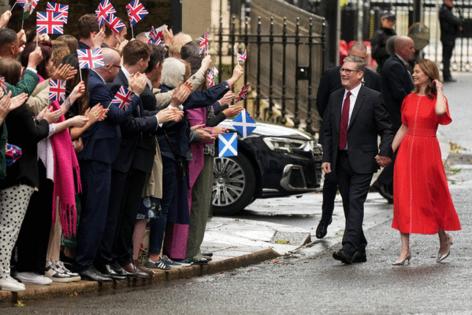Starmer vows stability after UK election victory exposes discontent
Published in News & Features
New British Prime Minister Keir Starmer promised a government of “stability and moderation” after leading his Labour Party to a landslide election victory that ended 14 years of Conservative rule that became characterized by turmoil and infighting.
In a dramatic reshaping of the political landscape, Labour took 412 of the 650 seats in the House of Commons, the most since Tony Blair’s 1997 triumph. The Tories garnered 121, their worst ever performance and calling time on Rishi Sunak’s stewardship of the country and his party.
Starmer, 61, vowed to “reset” British politics in a speech outside No. 10 Downing Street in London on Friday after he was formally appointed as premier by King Charles III at Buckingham Palace. “This will take a while, but have no doubt that the work of change begins immediately.” He said his administration would “rebuild Britain with wealth created in every community.”
Any Labour euphoria over the size of its win, though, will be quickly overshadowed by the scale of the challenges facing the next government. As well as the task of getting the economy growing more quickly, the election exposed divisions that look more entrenched. Indeed, the emphatic result was down to the splitting of the Tory vote in favor of more radical forces as much as an embrace of Labour policies.
Starmer has rebuilt his party since his left-wing predecessor Jeremy Corbyn led it to the worst performance in more than eight decades at the last election in 2019, a vote dominated by the U.K.’s tortuous departure from the European Union.
That lingering tension was confirmed by the rise of voices on the right and left fringes, from Brexit architect Nigel Farage’s populist Reform U.K. party, to left-wing independents who campaigned against the war in Gaza.
After ousting the Conservatives, Starmer sought to draw a contrast with their time in office. Starmer assured Britons that “you have a government unburdened by doctrine.”
The shift in the U.K. stands in contrast to some of its neighbors and allies. In France, parties are trying to figure out how to halt the rise of the far right after Marine Le Pen’s National Rally dominated the first round of parliamentary elections last weekend. In the U.S., Democrats are debating whether President Joe Biden is the man to stop Donald Trump.
Still, Labour won a massive parliamentary majority, but earned only around 34% of the vote share. In a message to those who did not vote Labour, Starmer promised to show that politics can be a force for good.
The new premier will appoint his cabinet later on Friday. Rachel Reeves, a former Bank of England economist and key to Labour’s pitch to business, will become the U.K.’s first female Chancellor of the Exchequer.
Indeed, financial markets have been sanguine. The FTSE 100 stock index rose, while gilt yields fell. The pound rose against a broadly weaker dollar to trade around $1.28.
“This wound, this lack of trust can only be healed by actions, not words,” Starmer said.
-------
(With assistance from Ellen Milligan, Joe Mayes, Aisha S Gani, Celia Bergin and Irina Anghel.)
©2024 Bloomberg L.P. Visit bloomberg.com. Distributed by Tribune Content Agency, LLC.







Comments